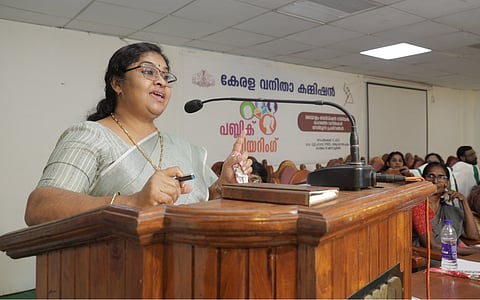

On the day she decided to speak out – at the shooting sets of a television series – about the unpaid remuneration of those who work in television like her, Malayalam actor Gayathri Varsha was sealing her fate. In a few days, she was replaced by another actor for asking basic questions about the remuneration of technicians and having an Internal Complaints Committee (IC) at the production. Gayathri recalled her experience at the first-ever public hearing organised by the Kerala Women’s Commission on Monday, September 11, to understand the problems of women working in television.
At the hearing held in Thiruvananthapuram, where actors and technicians from all genders were invited to be present, women spoke about the multitude of issues that they never had a platform to voice so far. Everything from the lack of basic facilities such as food, water, and clean toilets was raised.
However, Women’s Commission chairperson P Sathidevi pointed out that women were reluctant to file complaints, while Gayathri and dubbing artist Bhagyalakshmi elaborated why this happens. Women who raised issues, as basic as the remuneration they had every right to, would lose their jobs, and in no time be replaced, like Gayathri was. “Many artists work 16 to 17 hours a day. The work will start at 6 am, so they will need to wake up at 3 am, finish the housework, and then go to the location where they stay till 10 pm. There will be children and aged parents waiting at home and these women will be in tears thinking about them even as they play monstrous characters on television. But no one wants women talking about any of these issues, they want women silent and subaltern,” Gayathri said.
Dinesh Panicker, general secretary of the Association of Television Media Artistes (ATMA), also reiterated how this happens because the women, however senior they are, are afraid of losing job opportunities. He spoke about the time he saw an elderly woman artist, more than 70 years old, sit on the sets even as he left at 9 in the night since she still had three more hours of work, and that was after starting at 6 in the morning. But she wouldn’t complain because she was afraid, he said.
“The problem lies in the fact that all the artists who didn’t show up today did so thinking that they didn’t have an issue and so they had no need to come. That you don’t want to be there for the other is the problem,” Bhagyalakshmi said, narrating incidents where the artist who replaces another often does not ask what went wrong. The way artists are mercilessly replaced when they ask questions is the reason that many don’t raise complaints. This was true for ICs too, she said.
“When a harassment happens and you go to complain, the IC will ask for witnesses but no one who saw the incident will be ready to come forward. So no one complains,” she said.
B Unnikrishnan, who heads the Film Employees Federation of Kerala (FEFKA), said that this was the case in movies too — that women did not come forward to complain fearing they would lose opportunities. Out of the 24 complaints that the FEFKA Producers Association had received in the last three months, only one came from a woman, he said.
He added that there is also a class issue within the gender issue. “You cannot equate the problems of an actor who sits in a caravan with those of a hairdresser who does not even have a chair to sit in. A dancer who wants to change her sanitary napkin fails to find a toilet facility,” he noted.
He narrated an incident where a woman actor in a film told him about getting a urinary infection after she couldn’t access a toilet from 6 in the morning to 12 in the night, even as other co-workers had caravans with toilets in them.
The minister for cultural affairs, Saji Cherian, who inaugurated the meeting, said that a comprehensive film and television policy to ensure gender justice and equality will soon be finalised. He spoke about the Hema Commission report, which studied the problems of women in Malayalam cinema, as being in its final stages although it has been nearly four years since the commission had submitted its report. Besides a vague document of recommendations released last year, the government has not yet acted on the findings of the report. When concerned individuals and organisations sent queries and RTI pleas to release the findings, the government said that it was confidential.